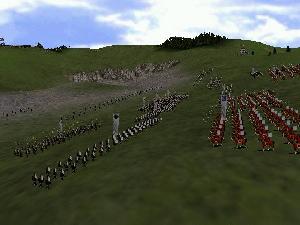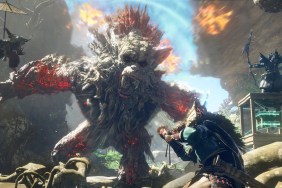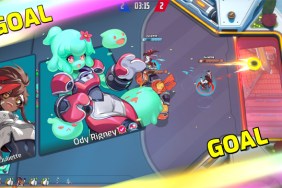A most honorable effort.
I recently took a much needed vacation in New York. It wasn’t very long and
I had to get back to work right away, but great nonetheless. There was a lot
to see in the city, but I’d have to say that the Metropolitan Museum of Art
kicks major ass. Yes, a museum can kick ass.
If you’ve ever been there, you know it’s all about the theme rooms. One moment
you’re looking at paintings on the wall; the next, you find yourself in a giant
atrium with an Egyptian archway. Or there’s the Greek balcony that looks out over
a white pillared room of marble statues.
And then there’s the Japanese room. You’re suddenly transported to some eastern
tea garden. I kept waiting for the dojo master to come out and challenge me.
Like the theme rooms of the Met, Shogun: Total War is a “themed” real time strategy focusing on Feudal Japan. Japan has been separated into seven regions, each controlled by a Daimyo. You control one of these Daimyos on a campaign to become the leader of all Japan – to become the almighty Shogun.
Opening the box, I came upon a sheet of “corrections.” Seems like there were a
whole bunch of glaring and blaring omissions and mistakes in the instruction manual.
I couldn’t help but feel very wary about the game.
Thankfully, the game isn’t as screwed up as the instructions. In fact, things
turn out quite well. Shogun provides a good change of pace to the traditionally
more fantasy or sci-fi-based real time strategies. The historical grounding gives
it a different feel and admittedly, a slight power trip.
The Tutorial mode is a good place to start. A Miyagi-esque voice talks you through
the game’s play techniques and strategy. In addition to the useful economic systems
and resource planning in nearly all real time strategies, there are unit types,
including archers, spearmen and cavalry. The strategy herein works like a game
of Paper/Rock/Scissors, or as the Japanese call it, Jankenpo. For example, the
archers are strong against the slow moving spearmen, but weak against the power
of your cavalry. It’s a good system that keeps it from becoming nothing more than
chaotic fighting.
The seven different clans have unique attributes. Each clan occupies a different geographical region with its own strengths and weaknesses. In your campaign to take over, you have access to espionage and diplomacy functions, but these take a backseat to what we’re all here for: WAR!
The structured system behind the battles is turn-based. Before you step foot on
the battlefield, you play from a map overlooking the region of Japan you control.
You can see the different resources available to you and what armies are where.
From there, you can observe your rivals and decide what to move where, what to
build, and most importantly, who to conquer. It has a distinct war room feel.
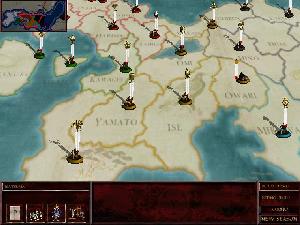 While the gameplay
While the gameplay
is interesting, Shogun could have worked harder at the little things to
make the whole experience much better. When you roll your mouse over an army unit,
for example, information is fed out about that army. Sometimes the color of the
font is just plain hard to read. Without an adequate contrasting color, it’s hard
to figure out the details on that specific army. Really hard.
Since the game is focused on war, diplomacy and espionage are more like orders that you send out and receive word back on – nothing especially involving, just cross your fingers and wait. And unless you are a master of hot keys, the interface will repeatedly annoy you.
Graphically, this is a mixed bag. There are particle effects of fog and snow,
and while the former looks good, the latter could have looked much better. Environmentally,
expect the rolling green hills and expansive plains that make up old school Japan.
It’s good, but not great. The soldiers don’t animate perfectly. However, the sense
of having giant armies sweeping across the countryside is genuinely there. Basically,
the graphics get the job done.
Musically, things sound appropriate and Japanese. You’ll hear plenty of those
giant Taiko drums and some old man yodeling in the background. I’m no expert on
the music of Japan, but it definitely has that feel. And what I really appreciate
is having everything spoken to me in Japanese. It does wonders for authenticity.
Shogun provides a refreshing change of pace for real-time strategists.
If you are deeply interested in Japanese history, you will appreciate this game
that much more.
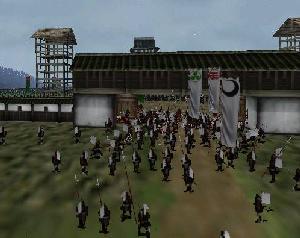
-
Strategy and depth is there
-
Sense of historical control/power
-
The presentation of it all
-
Interface problems
-
So-so graphics
